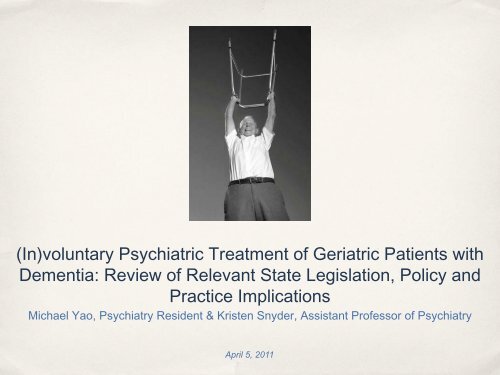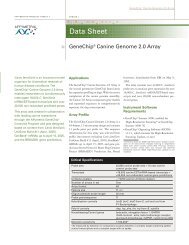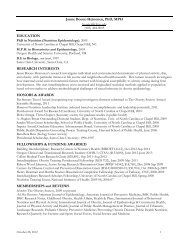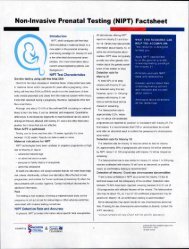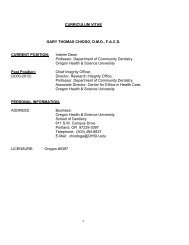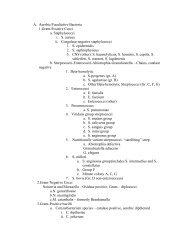(Involuntary) Psychiatric treatment of geriatric patients ... - OHSU Home
(Involuntary) Psychiatric treatment of geriatric patients ... - OHSU Home
(Involuntary) Psychiatric treatment of geriatric patients ... - OHSU Home
Create successful ePaper yourself
Turn your PDF publications into a flip-book with our unique Google optimized e-Paper software.
(In)voluntary <strong>Psychiatric</strong> Treatment <strong>of</strong> Geriatric Patients with<br />
Dementia: Review <strong>of</strong> Relevant State Legislation, Policy and<br />
Practice Implications<br />
Michael Yao, Psychiatry Resident & Kristen Snyder, Assistant Pr<strong>of</strong>essor <strong>of</strong> Psychiatry<br />
April 5, 2011
Learning objectives:<br />
Describe the context and intent <strong>of</strong> recent legislation<br />
expanding authority <strong>of</strong> Healthcare Powers <strong>of</strong> Attorney<br />
regarding involuntary psychiatric <strong>treatment</strong><br />
List three legal and three clinical implications <strong>of</strong> the<br />
new statute<br />
Discuss the ethical framework around the issue <strong>of</strong><br />
surrogate decision-making and describe how it applies<br />
to the participant’s own practice
During our talk today…<br />
To help you achieve these objectives, we will cover the<br />
following ground:<br />
We will identify the <strong>treatment</strong> population <strong>of</strong> interest,<br />
The questions that arise in the <strong>treatment</strong> <strong>of</strong> this<br />
population,<br />
Review the use <strong>of</strong> proxy decision-makers and models<br />
for proxy decision making for psychiatric care,<br />
And discuss Senate Bill 16 and it’s implications.
Dementia: At the interface <strong>of</strong><br />
medicine and psychiatry<br />
With the aging <strong>of</strong> the US population, dementia is<br />
becoming increasingly common in our communities and<br />
in our practice settings.<br />
As “Baby Boomers” age, the Alzheimer’s Association<br />
predicts that the number <strong>of</strong> Oregonians with dementia<br />
will increase:<br />
33% between 2000 and 2010<br />
58% between 2000 and 2020<br />
93% between 2000 and 2025.
Dementia: At the interface <strong>of</strong><br />
medicine and psychiatry<br />
Dementias are complex medical syndromes with<br />
characteristic underlying pathophysiological mechanisms,<br />
but are somewhat unpredictable with regards to their<br />
psychiatric and behavioral manifestations.<br />
However, 40-90% <strong>of</strong> <strong>patients</strong> will develop such symptoms<br />
at some point during their journey with these illnesses and<br />
these symptoms have enormous impact on patient quality<br />
<strong>of</strong> life, caregivers and the settings in which these <strong>patients</strong><br />
reside.<br />
This contributes to variability in the settings and treating<br />
specialists involved in the care <strong>of</strong> these <strong>patients</strong>.
Dementia: At the interface <strong>of</strong><br />
medicine and psychiatry<br />
Management <strong>of</strong> <strong>patients</strong> with dementia is considered<br />
within the scope <strong>of</strong> medicine and neurology practice.<br />
However, expertise in the <strong>treatment</strong> <strong>of</strong> the more<br />
problematic behavioral symptoms or psychiatric<br />
manifestations is <strong>of</strong>ten lacking.<br />
Psychiatry may seem a natural realm for addressing these<br />
aspects <strong>of</strong> dementing illness, but psychiatric care is<br />
historically bound by legal and ethical principles which<br />
make <strong>treatment</strong> <strong>of</strong> these <strong>patients</strong> challenging!
Dementia: Questions for the<br />
healthcare system<br />
So, when <strong>patients</strong> with dementia exhibit psychiatric or<br />
problematic behavioral symptoms:<br />
Where do these <strong>patients</strong> go for<br />
<strong>treatment</strong>?<br />
What if a patient lacks insight or<br />
otherwise refuses <strong>treatment</strong>?<br />
How can the <strong>patients</strong>’ own<br />
preferences be best represented and<br />
effectively enforced?
Dementia: Questions for the<br />
healthcare system<br />
Until recently these <strong>patients</strong> have been<br />
treated in emergency departments and<br />
other urgent care settings, only to be<br />
quickly returned home after “ruling out”<br />
for acute medical illness, rarely with<br />
<strong>treatment</strong>s that have an impact on<br />
behaviors over time.<br />
If psychiatric or behavioral symptoms<br />
emerge in acute or long-term medical<br />
settings, these <strong>patients</strong> are <strong>of</strong>ten diverted<br />
or discharged due to intense regulatory<br />
scrutiny <strong>of</strong> peer/staff safety.<br />
And if directed towards psychiatric<br />
settings, there have been significant<br />
barriers to achieving admission and<br />
sufficient duration <strong>of</strong> <strong>treatment</strong> for these<br />
<strong>patients</strong>.
Dementia: Implications for the<br />
healthcare system<br />
Advocates for more direct and sustained access to<br />
psychiatric <strong>treatment</strong> for these <strong>patients</strong> have argued that<br />
there are legitimate indications for short-term psychiatric<br />
stabilization including:<br />
Prominent behavioral disturbances such as self-harm,<br />
agitation and aggressiveness.<br />
And, behaviors requiring safeguards not found in medical,<br />
residential, or home settings.<br />
Short-term hospitalization could result in improved<br />
quality <strong>of</strong> life for these <strong>patients</strong>, result in decreased patient<br />
anxiety and agitation, and allow for development <strong>of</strong><br />
behavioral support plans and safe return to less restrictive<br />
environments.
Proxy Decision Making<br />
But what if the patient says “NO” to psychiatric <strong>treatment</strong>?<br />
A patient’s right to self-determination in <strong>treatment</strong> is an overriding<br />
principle in medical ethics.<br />
Patient self-determination is addressed through the framework <strong>of</strong><br />
informed consent and related concepts <strong>of</strong> mental capacity and best<br />
interests.<br />
When decisional capacity is limited, the need for a proxy becomes<br />
apparent.<br />
Proxy decision makers may include legal guardians, healthcare power<br />
<strong>of</strong> attorneys (HCPOA), family members, medical personnel and<br />
others, amongst whom prioritization is determined via legislative<br />
policy.
Protection <strong>of</strong> Vulnerable<br />
Populations: Advance Directives<br />
Advance Directives (ADs)link the concepts <strong>of</strong> self-determination<br />
with proxy decision-making.<br />
Advance Directives are derived from “right-to-die” cases seeking to<br />
safeguard patient autonomy and self determination in the case <strong>of</strong><br />
future patient incompetency.<br />
They emerged from the Patient Self-Determination Act (PSDA):<br />
1990 federal legislation that requires providers to inform all adult<br />
<strong>patients</strong> about their rights to accept or refuse medical or surgical<br />
<strong>treatment</strong> and the right to execute an “advance directive”.
Healthcare Advance Directive<br />
In Oregon, ORS 127.505-127.660, AD form under ORS 127.531:<br />
The patient executing an AD, known as the principal, is presumed to<br />
be <strong>of</strong> “sound mind”.<br />
The principal can indicate <strong>treatment</strong> preferences, designate a HCPOA,<br />
determine his/her authority, stipulate (or not) expiration date <strong>of</strong> the<br />
AD.<br />
ADs are binding and enforceable at, and only at, times <strong>of</strong> patient<br />
incompetency or inability to communicate wishes.<br />
Objections to the AD can be made through defined procedures<br />
outlined in AD legislation.<br />
A capable principal can revoke AD and HCPOA designation at<br />
anytime, and revoke life-sustaining <strong>treatment</strong>s as long as wishes can be<br />
communicated to HCPOA or medical provider, irrespective <strong>of</strong><br />
capacity.
Advance Directives and<br />
mental health <strong>treatment</strong><br />
The scope <strong>of</strong> ADs, however, vary state by state<br />
Prior to 2009, Oregon limited the health care<br />
representative’s authority to consent to the following<br />
<strong>treatment</strong>s (ORS 125.540):<br />
1) Admission to or retention in a health care facility for care or<br />
<strong>treatment</strong> <strong>of</strong> mental illness<br />
2) Convulsive <strong>treatment</strong><br />
3) Psychosurgery<br />
4) Sterilization<br />
5) Abortion<br />
Thus, ADs did not allow for psychiatric care via proxy<br />
decision maker.
<strong>Psychiatric</strong> Advance Directives<br />
In 1993, Oregon passed the Declaration for Mental Health Treatment<br />
allowing individuals to provide written directive and designate proxy<br />
decision makers to carry out preferences pertaining to:<br />
convulsive <strong>treatment</strong><br />
<strong>treatment</strong> <strong>of</strong> mental illness with psychoactive medication<br />
admission to and retention in a health care facility for a period not to exceed<br />
17 days for care or <strong>treatment</strong> <strong>of</strong> mental illness<br />
outpatient mental health services<br />
By 2003, 17 states developed explicit statutes supporting the use <strong>of</strong><br />
“psychiatric advance directives” (PAD). (Srebnik and Brod<strong>of</strong>f, 2003)<br />
Differences exist in advance statement accessibility, production,<br />
implementation, legal enforceability, and compatibility with<br />
involuntary <strong>treatment</strong> across US and Europe (Henderson et al, 2008)
Declaration for Mental Health<br />
Treatment (ORS 127.700-127.737)<br />
To Execute:<br />
Principal must be <strong>of</strong> sound mind<br />
Principal may designate proxy decision maker<br />
Two competent adults witnesses must countersign and attest that the principal was not<br />
under duress, influence, or engaged in fraud<br />
To Operationalize:<br />
Declaration remain in effect for 3 years or until revoked by principal<br />
Takes effect when the principal has been found to be incapable<br />
”Ulysses Clause” prohibits principal from revoking the document while incapacitated<br />
Proxy decision maker must carry out written instructions <strong>of</strong> the principal<br />
if preferences unknown, the proxy acts in the best interest <strong>of</strong> the principal.<br />
To Override:<br />
If principal is committed to the Oregon Health Authority<br />
If there is immediate danger to life or health <strong>of</strong> self or others<br />
Providers not bound to carry out <strong>treatment</strong> plan if sufficiently diverges from practice<br />
standards
<strong>Psychiatric</strong> Advance Directives<br />
consumer/family empowerment<br />
enhance informed decision-making<br />
ameliorate interpersonal/clinical relationships<br />
focus on prevention<br />
reduce hospitalization and need for<br />
commitment/guardianship<br />
in Theory<br />
capacity to execute document/finding<br />
appropriate<br />
representatives<br />
PADs not recognized or overridden<br />
conversely, PADs irrevocable during acute illness<br />
PADs not guarantee preferred <strong>treatment</strong><br />
Limited awareness and access to PADs<br />
Lacking enforcement/monitoring <strong>of</strong> PADs<br />
Stigma<br />
(Backlar and McFarland, 1998)
<strong>Psychiatric</strong> Advance Directives in<br />
Practice: Access and Implementation<br />
PAD access and implementation:<br />
Preliminary Oregon survey (Backlar and McFarland, 1996):<br />
N=156 family members and providers<br />
64 facilitated completed PADs, 10 PADsoperationalized<br />
Barriers: limited understanding <strong>of</strong> PAD laws, problematic dissemination and implementation<br />
Survey <strong>of</strong> public sector psychiatric out<strong>patients</strong> in 5 US cities (Swanson et al, 2006):<br />
N= 1,011 from California,Florida, Illinois, Massachusetts, and North Carolina<br />
Only 4-13% completed PADs while 66-77% expressed interest in completing PADs<br />
Demand positively correlated with a marginalized demographic and experience <strong>of</strong> decreased<br />
personal autonomy<br />
Actual completion positively correlated with higher insight, access to social supports, and external<br />
<strong>treatment</strong> pressures<br />
Potential barriers: lack <strong>of</strong> awareness/understanding <strong>of</strong> PAD laws, limited capacity and support to<br />
complete process, institutional noncompliance with PAD, limited systemic<br />
education/enforcement/monitoring <strong>of</strong> PADs
<strong>Psychiatric</strong> Advance Directives in<br />
Practice: Controversies<br />
Should there be formal capacity assessment as part <strong>of</strong> completing PAD?<br />
Evaluation <strong>of</strong> 80 SPMI <strong>patients</strong> with high utilization show adequate decision-making capacity (Srebnik<br />
and Appelbaum, 2004)<br />
Capacity assessment may be viewed as discriminatory and barrier to completion <strong>of</strong> PAD but is<br />
warranted in cases <strong>of</strong> high clinical suspicion, preexisting doubts (Srebnik and Kim, 2006)<br />
When should PADs be activated?<br />
Most states link activation <strong>of</strong> PADs to clinical standards for determining incapacity<br />
“Tailored Activation”- individualized criteria for incapacitydetermining activation <strong>of</strong> PAD<br />
Difficulty arises in determining whether PADs may be enforced in a voluntary <strong>treatment</strong> setting<br />
What if client’s current wishes <strong>of</strong> patient diverges from PAD? (Srebnik and Kim, 2006)<br />
Right to Refuse Treatment vs Duty to Treat, or when can PADs be revoked or overridden?<br />
Most states prohibit revocation <strong>of</strong> PAD if client is urrently incapacitated<br />
Most states are silent on how to enforce PAD if client is incapable <strong>of</strong> revoking but is refusing <strong>treatment</strong><br />
Providers may not honor PAD if there is significant divergence from clinical practice standards (Srebnik<br />
and Brod<strong>of</strong>f, 2003)<br />
Hargravev. Vermont 2003- established precedent <strong>of</strong> committed patient to refuse all <strong>treatment</strong> based on<br />
competently executed PAD<br />
Autonomy vs state police and parenspatriaepowers-Committable but untreatable <strong>patients</strong>? (Swanson et<br />
al, 2006, Miller, 1998)
So what about <strong>patients</strong> with dementia and<br />
behavioral disturbance in Oregon?<br />
So we see:<br />
AD and PAD statutes are in many ways imperfect in<br />
addressing this patient population.<br />
What has been the practice when psychiatric hospitalization<br />
has been sought?<br />
Mental health providers have utilized the tools they are most<br />
familiar with:<br />
The Notice <strong>of</strong> Mental Illness, found in state involuntary <strong>treatment</strong><br />
statutes, has routinely been employed when admitting <strong>patients</strong> with<br />
dementia related behavioral disturbances who do not have capacity<br />
to provide informed consent or refuse consent for acute psychiatric<br />
care.
Evolution <strong>of</strong> <strong>Involuntary</strong><br />
Treatment Law in Oregon<br />
<strong>Involuntary</strong> <strong>treatment</strong> law has evolved in Oregon over the last two centuries:<br />
In 1862, the first commitment standard was established allowing a county<br />
judge to order hospitalization for those “by reason <strong>of</strong> insanity...is suffering<br />
from neglect, exposure or otherwise, or is unsafe to be at large, or is suffering<br />
under mental derangement”.<br />
Over time, statute evolved to increase the levels <strong>of</strong> civil rights protection for<br />
those with mental illness such that in 1973, commitment statutes emerged<br />
that closely resemble what is utilized in Oregon today, with the following<br />
definition:<br />
A mentally ill person is a person who, because <strong>of</strong> a mental disorder, is<br />
either dangerous to himself or others or is unable to provide for his basic<br />
personal needs and is not receiving care that is necessary for his health or<br />
safety. (Bloom, Am Acad Psychiatry Law 32:430–9, 2004)
Are <strong>Involuntary</strong> Treatment Statutes<br />
applicable to Dementia?<br />
However, there are two aspects <strong>of</strong> involuntary <strong>treatment</strong> under<br />
commitment statutes in Oregon that make it difficult to apply<br />
these laws to those with dementing illness and behavioral<br />
disturbance:<br />
Commitment court trends reflect “increasing focus on<br />
dangerousness as the principle standard for which commitment<br />
is pursued”, those “gravely disabled” by their illnesses are <strong>of</strong>ten<br />
neglected in practice.(Bloom, Am Acad Psychiatry Law 32:430–9, 2004 )<br />
Further, the commitment period <strong>of</strong> 180 days for <strong>treatment</strong><br />
presumes the clinical possibility <strong>of</strong> reversing or ameliorating the<br />
illness prompting commitment.<br />
Thus, rarely does a patient with dementia end up referred to a<br />
commitment hearing.
Guardianship<br />
The alternative to commitment has been to have family<br />
members seek guardianship:<br />
PROS: Guardianship allows an avenue for obtaining<br />
informed consent for <strong>treatment</strong> in psychiatric settings<br />
and for eventual placement in appropriate chronic care<br />
settings.<br />
CONS: Even when obtained as a “temporary” or<br />
“emergency” measure, guardianship takes time to secure<br />
(a minimum typically <strong>of</strong> 7-14 days), is expensive, and<br />
<strong>of</strong>ten requires release <strong>of</strong> medically supporting evidence.
Where we stood in 2009...<br />
So, to recap, in Oregon prior to 2009:<br />
AD statutes limited HCPOA from consenting to psychiatric<br />
<strong>treatment</strong> for the principals with dementia and behavioral<br />
disturbance.<br />
PADs were underutilized and rarely honored, and hence,<br />
impractical for the growing population <strong>of</strong> <strong>patients</strong> with dementia.<br />
Commitment statutes were being applied to only a subset <strong>of</strong> these<br />
<strong>patients</strong> (those overtly aggressive or dangerous) and by a subset <strong>of</strong><br />
counties.<br />
And, guardianship was costly and neither timely enough or<br />
practical enough for families to secure needed emergent <strong>treatment</strong>.
The Birth <strong>of</strong> SB 16
The birth <strong>of</strong> SB 16<br />
Geriatric psychiatrist Maureen C. Nash, MD, MS, who<br />
practices at Tuality Medical Center, was seeing increasing<br />
numbers <strong>of</strong> older adults being referred for psychiatric<br />
hospitalization due to dementia and behavior disturbances who<br />
had signed advance directives but were still being required to go<br />
through the mental health involuntary commitment process or<br />
the temporary guardianship process in order to be admitted to<br />
psychiatric facilities for <strong>treatment</strong> and stabilization.<br />
She requested amendment to AD statutesthrough the the<br />
Senate Interim Committee on HHS to expand health care<br />
representative authority to consent to psychiatric<br />
hospitalization and <strong>treatment</strong>.
The birth <strong>of</strong> SB 16<br />
State Senator Monnes Anderson contacted DRO executive Director Bob<br />
Joondeph to draft such a statute.<br />
Mr. Joondeph’s initial draft proposed modifying the statutory form <strong>of</strong> the<br />
advance directive by adding a section to show whether the health care<br />
representative had been authorized to consent to short-term hospitalization for<br />
<strong>treatment</strong> <strong>of</strong> dementia.<br />
Debate in state legislature ensued…<br />
New draft <strong>of</strong> bill- A-Engrossed proposed by state Rep Mitch Greenlick would<br />
have allowed a health care representative to consent to psychiatric<br />
hospitalization for an unlimited length <strong>of</strong> time with no review and no<br />
opportunity for the principal to object.<br />
This was opposed by MH advocacy groups and Elder Law section <strong>of</strong> the<br />
Oregon Bar Association among others.
The birth <strong>of</strong> SB 16<br />
The bill was redrafted by Bob Joondeph and Tina C.<br />
Kitchin, MD, medical director, Seniors and People with<br />
Disabilities, Oregon DHS:<br />
Redefining dementia as medical/neurological illness<br />
Adding a limit to hospitalization duration <strong>of</strong> 18 days.<br />
Providing the principal with the ability to limit or restrict the<br />
health care representative’s authority.
What did the final version say?<br />
Section 1(7) <strong>of</strong> SB 16 adds a definition for “dementia” to ORS 127.505<br />
“Dementia” means a degenerative condition that causes progressive deterioration<br />
<strong>of</strong> intellectual functioning and other cognitive skills, including but not limited to<br />
aphasia, apraxia, memory, agnosia and executive functioning, that leads to a<br />
significant impairment in social or occupational function and that represents a<br />
significant decline from a previous level <strong>of</strong> functioning. Diagnosis is by history and<br />
physical examination.<br />
Section 2(6) amends ORS 127.535 to provide that hospitalization for up to 18 days<br />
for <strong>treatment</strong> <strong>of</strong> dementia-related behavior is not prohibited by ORS 127.540<br />
(limitations on authority <strong>of</strong> health care representative).<br />
A person can limit health care representative authority by including appropriate<br />
language in the “special conditions or instructions” section in Part B <strong>of</strong> the advance<br />
directive form.<br />
Section 3 <strong>of</strong> SB 16 also provides a sunset for the bill on January 2, 2012.
What didn’t it say?<br />
The statute left unspecified whether or not an admission could be<br />
consented for in the case <strong>of</strong> a presumptive diagnosis <strong>of</strong> dementia.<br />
It also left unspecified what constituted the forms <strong>of</strong> mental health<br />
<strong>treatment</strong> which could be authorized by the health care<br />
representative.<br />
It left unaddressed liability concerns in outcomes <strong>of</strong> <strong>treatment</strong> where<br />
the health care representative’s decisions were overridden or<br />
disregarded in emergency situations where life and safety were at<br />
stake.<br />
And, because the bill retroactively granted authority to the health<br />
care representative to allow for psychiatric hospitalization designated<br />
under all existing ADs, it didn’t address what should happen if the<br />
principals never discussed the issue <strong>of</strong> psychiatric <strong>treatment</strong> with<br />
their health care representative.
And more questions, questions,<br />
questions…<br />
When does the clock start on the 18 days for<br />
<strong>treatment</strong>?<br />
What happens if additional <strong>treatment</strong> is<br />
required beyond the 18 days?<br />
Is there a minimum interval <strong>of</strong> time before the<br />
clock can be restarted?<br />
Who is watching the clock?<br />
With authorization <strong>of</strong> the health care<br />
representative, are psychotropic medications<br />
allowed? Can these medications be<br />
administered involuntarily? Can injections be<br />
given? Can physical restraint be authorized?<br />
Who is ensuring protection <strong>of</strong> civil liberties<br />
during this period <strong>of</strong> involuntary <strong>treatment</strong>—<br />
who is watching us?
The unanswered questions with respect to<br />
surrogate decision making under SB16...<br />
Perhaps the most troubling aspects to this legislation are the unanswered<br />
questions it leaves with respect to issue <strong>of</strong> surrogate decision making around<br />
psychiatric care for <strong>patients</strong> with progressive dementias:<br />
Currently law pertaining to proxy decision making for care decisions in<br />
Oregon, and in general, demonstrates a gradual movement towards<br />
“advanced planning” with de-emphasis on forms <strong>of</strong> “substituted judgment”<br />
and “best interests” decision making. (Sabatino, 2010; Uniform Health-<br />
Care Decisions Act, 1993)<br />
However, psychiatric <strong>treatment</strong> rarely enters into these discussions except in<br />
those cases where a primary psychiatric disorder has been diagnosed.<br />
And psychiatric <strong>treatment</strong>, when provided under current involuntary<br />
<strong>treatment</strong> statutes, has protections for patient autonomy and “rights to refuse<br />
<strong>treatment</strong>” that are not included under the legislative rules <strong>of</strong> SB16.
The unanswered questions with respect to<br />
surrogate decision making under SB16...<br />
Presumably, the health care representative<br />
designated in the AD by the principal, has<br />
guidance in the AD regarding what the principal<br />
would have wanted in various care<br />
circumstances.<br />
However, the current AD as outlined in Oregon<br />
statute does not encourage discussion <strong>of</strong><br />
theoretic need for psychiatric care or detail<br />
aspects <strong>of</strong> such psychiatric <strong>treatment</strong>.
The unanswered questions with respect to<br />
surrogate decision making under SB16...<br />
In a review <strong>of</strong> AD <strong>of</strong> 126 residents <strong>of</strong> three Maryland nursing homes<br />
with end-stage dementia (Triplett et al, 2008):<br />
Completion <strong>of</strong> ADs positively correlated with Caucasian race, higher<br />
education, and access to social supports<br />
And ADs were primarily used to restrict, not request forms <strong>of</strong> care,<br />
instructions for <strong>treatment</strong> were nonspecific with exception <strong>of</strong> comfort<br />
care and pain <strong>treatment</strong>.<br />
Studies in fact demonstrate that surrogates correctly predict patient<br />
wishes around care not discussed only about two-thirds <strong>of</strong> the time.<br />
(Shalowitz et al, 2006)<br />
And, in the case <strong>of</strong> surrogate decision making for those with dementia,<br />
due, in part, to the complex impact <strong>of</strong> dementia on both the physical and<br />
cognitive abilities <strong>of</strong> the principal, there is evidence that there is<br />
significant variability among surrogates with regards to<br />
understanding/prioritizing goals <strong>of</strong> <strong>treatment</strong>, the beliefs and values that<br />
underlie these goals and the impact <strong>of</strong> dementia relevant to personhood<br />
that guide <strong>treatment</strong> decisions. (Kaldjian et al, 2010)
So, what are we left with? Where is<br />
the law moving from here?<br />
SB 16 is set to sunset January 2012 in it’s current form:<br />
Are there modifications that need to be made?<br />
Limitations that need to be placed?<br />
More extensive administrative rule to guide <strong>treatment</strong><br />
and to delineate when court commitment law should be<br />
implemented?<br />
Should the law be broadened to develop a place for MH<br />
advance directives?
Bills that emerged this<br />
Senate Bill 221:<br />
session:<br />
This bill would simply make changes enacted by SB 16 permanent,<br />
essentially removing the sunset provision.<br />
This bill has already passed the Senate and has gone onto the House for<br />
approval.<br />
House Bill 2375:<br />
This bill has been abandoned, but would have allowed SB 16’s<br />
provisions to sunset as scheduled and then would have removed the<br />
prohibition against health care representatives admitting principles for<br />
<strong>treatment</strong> <strong>of</strong> mental illness as outlined in the AD statutes.<br />
This would have opened up the possibility <strong>of</strong> proxy’s being able to<br />
approve involuntary psychiatric hospitalization for <strong>treatment</strong> <strong>of</strong> any<br />
mental illness for any duration <strong>of</strong> time, presuming the principal had an<br />
AD designating a HCPOA and that the principal were deemed<br />
incapacitated.
Discussion/questions…<br />
Special Thanks to:<br />
Joseph Bloom MD, <strong>OHSU</strong><br />
Bob Joondeph, Executive Director Disability<br />
Rights Oregon<br />
John McCulley, Oregon <strong>Psychiatric</strong> Association<br />
Maureen Nash MD, MS Medical Director Tuality<br />
Center for Geriatric Psychiatry<br />
Leigh Schwarz, VA Regional Counsel


